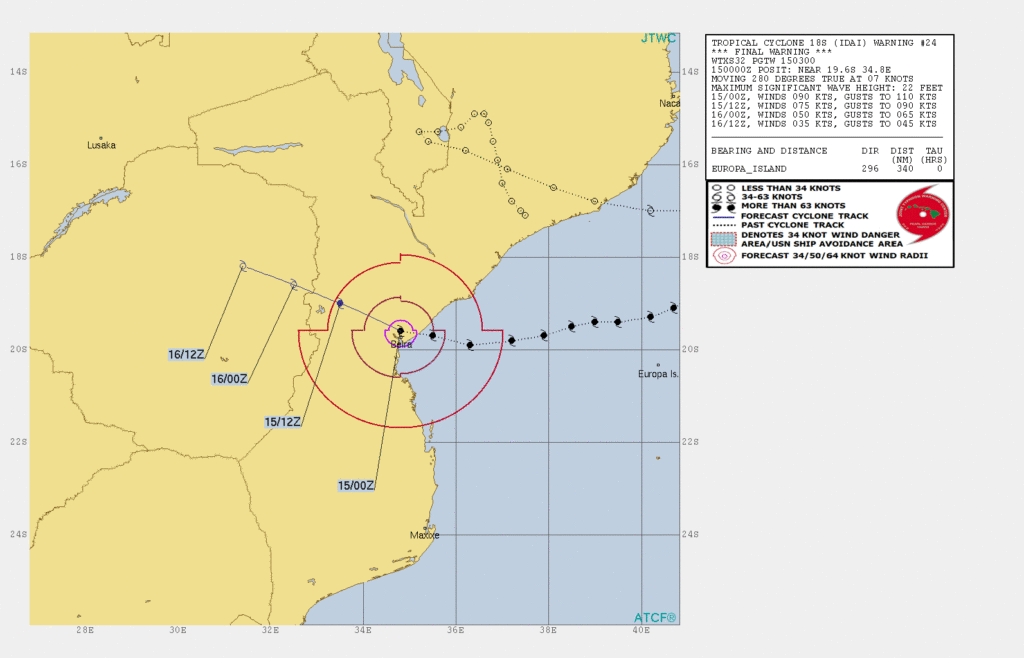On March 25, 2019, Team Rubicon received an official assignment from the Mozambique Minister of Health through the World Health Organization to provide an EMT Type-1 Mobile unit to central Mozambique, in response to the March 15 Cyclone Idai that caused major, widespread flooding and catastrophe infrastructure damage.

The United Nations reports that more than 1.8 million people need aid in southeast Africa and called the situation a level-3 emergency “on par with worn-torn Yemen, Syria and South Sudan.”
Mozambique is a coastal country in southeastern Africa that sits across the Indian Ocean from Madagascar, is home to more than 29 million people, half of which are under age 15 with more than 76 percent living in poverty, according to the United Nations Human Development Report.
From 1752 until 1975, Mozambique was a Portuguese colony, though the Front for the Liberation of Mozambique (FRELIMO) was formed in 1962, which fought for the country’s independence. In 1975, Frelimo’s leader became Mozambique’s first president.
In1976, a group called the Mozambican National Resistance (RENAMO), armed by foreigners in Rhodesia (now Zimbabwe) and then South Africa, set to topple the new government, and this launched the country into a bloody civil war that killed more than one million people. The civil war lasted until 1992, and Mozambique’s first multi-party elections were held in 1994.
Human-caused disasters aren’t the only situations that have plagued and ravaged this country. The Global Facility for Disaster Reduction and Recovery reported, “Mozambique ranks third among African countries most exposed to multiple weather-related hazards and suffers from periodic cyclones, droughts, floods, and related epidemics. Drought occurs primarily in the southern region, with a frequency of seven droughts for every 10 years. Floods occur every two to three years, with higher levels of risk in the central and southern regions. In 2015, the onset of flooding and Cyclone Chedza resulted in 140 deaths, the destruction of over 2,300 classrooms, and damages and losses totaling $861 million, or five percent of GDP, as estimated by a rapid needs assessment supported by the ACP-EU Natural Disaster Risk Reduction Program.”
Beira, a port city that sits on the Mozambique Channel, is one of country’s three dense population areas, and this area was the hardest hit by the Cyclone Idai. Approximately 90 percent of the city was destroyed when the storm caused a dam to burst. As of March 28, more than 468 people in Mozambique have been reported dead, and 110,000 displaced people are now residing in camps, according to Celso Correia, Mozambique’s Environment Minister and rescue efforts are still underway to reach people trapped by the floods. Much of the country is disconnected from electrical supplies so that is also impeding rescue efforts. Correia said they are expecting outbreaks of cholera and malaria. And UNICEF’s health and nutrition chief James McQuen Patterson said that the shelters “run the risk of infectious diseases,” such as measles and diarrhea.
Zachary Brooks-Miller, TR’s Director of Field Operations, lived in central Mozambique in 2011 and 2012 and worked clearing land mines left over from the country’s civil war. He said, “A storm with the ferocity of Cyclone Idai would challenge most countries’ response mechanisms. The impact of Cyclone Idai was devastating to the people of Sofala and Manica Provinces, exacerbating an already fragile medical and transportation infrastructure. In the coming days and weeks the prospect of a cholera and vector-borne outbreak will become a serious threat. Team Rubicon is deployed and stands ready to work with the Mozambique Ministry of Health and the World Health Organization to deliver targeted medical aid to those in need.”
Sebastian Rhodes Stampa of the UN Office for the Coordination of Humanitarian Affairs (OCHA) said two large field hospitals and water purification systems are on their way, according to The Guardian. TR’s EMT mobile team started its work in Mozambique on March 27.
Last summer, Team Rubicon was the first non-government agency in North America to receive the World Health Organization’s certification of Emergency Medical Team Type 1 mobile verification. TR has two EMT Type 1 Teams that can support outpatient mobile clinics anywhere in the world.
“The effects of Cyclone Idai are sobering. We’re prepped and humbled to be working side by side with local communities and our broader humanitarian partners to provide critically needed medical services in Mozambique,” said Corey Eide, TR’s Director of Capabilities.



